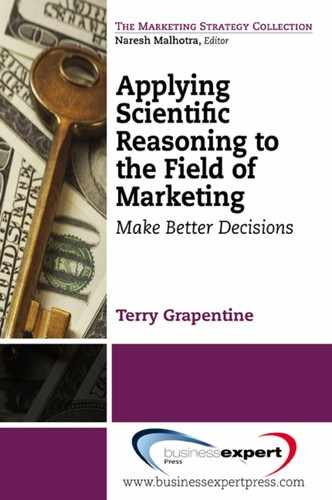A Personal Observation from Mike Sundet, Vice President, Anheuser-Busch InBev
I don’t know about you, but I made it through undergraduate and graduate schools without taking any courses in philosophy of science, critical thinking, or logic. Although some would say that I’ve been relatively successful in my career, I’m confident that I would have been more so, and certainly will be a better decision maker in the future because of Terry’s book, Applying Scientific Reasoning to the Field of Marketing: Make Better Decisions. So before you begin reading the book, I want to tell you about what most resonated with me.
I have never taken a class on how to use logic to strengthen my recommendations to management (or my wife). Certainly, by virtue of making mistakes, most of us learn some general dos and don’ts about how to do this. Nonetheless, I particularly enjoyed the book’s Chapter 11 on arguments and logical fallacies. Here, the book not only gave me concrete advice on how to more effectively think through how to frame a proposition (and evaluate others’ propositions), but it recommends a software product to help me do this.
My view of “theory” was pretty much as Terry outlined. Before reading the book, I thought theories are what professors work with at universities. Theories are academic and impractical for business people. Through his many examples, Terry has impressed upon me what theory really is about—it’s a tool for creating knowledge. It’s a tool that science has used for centuries to create knowledge. Terry’s right: marketers should use the same tools to create marketing knowledge as scientists use to create scientific knowledge.
I need—we all need—to realize that the world is more complex than we would like it to be. The book’s Chapter 8 on causality helped to drive this point home. I especially like the following (of the many pithy) quotes Terry sprinkles throughout his book: “For every complex problem there is an answer that is clear, simple, and wrong” (H.L. Mencken). For me, this emphasizes the importance of marketers using sound critical thinking skills in thinking about the complex markets we try to manage, and the recommendations we give to our mangers to better our companies’ market positions and profits.
Finally, one of the book’s overarching messages is that there is no “silver bullet” in learning about how to make effective marketing decisions. In fact, as Terry says at the end of the book, learning how to apply scientific reasoning to marketing is a lifelong journey. Remember that the next time you see a magazine article promising to unlock the secrets of business failures or get an e-mail about an upcoming conference promoting marketing success strategies. Don’t get me wrong, you can sometimes get good ideas from these resources, but they mostly tell you what to think, not how to think. If you don’t know how to think well, knowing what to think won’t take you very far.
Mike Sundet
Vice President
Anheuser-Busch InBev
St. Louis, Missouri
